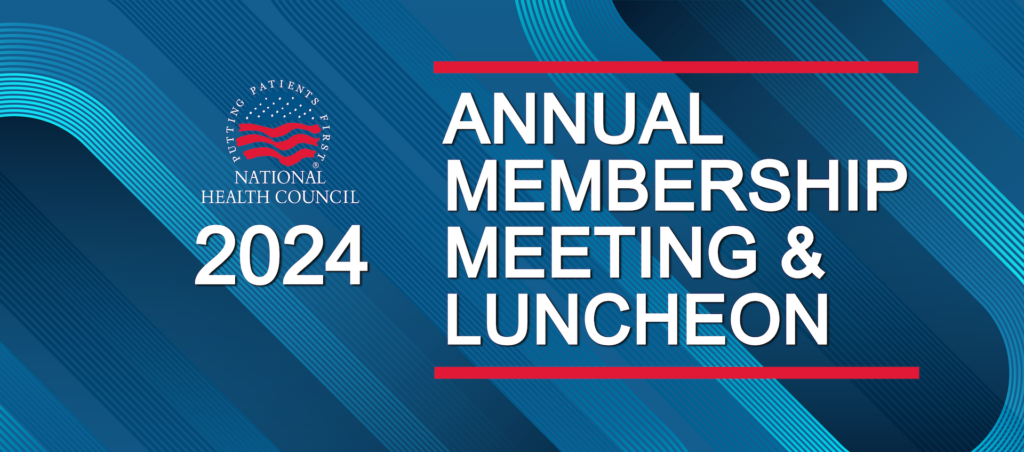

Health Care Riders
By: Allen Pinn, Coordinator, Policy
In January, the Senate and House reached an agreement to fund the government through the first week of March. While this agreement is on overall spending levels for the various federal agencies, Congress still needs to pass individual appropriations bills. Since it is likely this appropriations package will be one of the last meaningful pieces of legislation before the November elections, other policy priorities may be added to that final legislation as it gets closer to passage. These are called “riders,” and some of them are related to health care and are of importance to patients and National Health Council (NHC) members.
In November 2023, the NHC submitted a letter to House and Senate leadership about the inclusion of health care transparency and affordability provisions in future spending packages. We reiterated these priorities to start the year in January 2024. Below is an overview of the priorities the NHC outlined to Congressional leadership to ensure greater transparency and affordability across the health care spectrum.
System-Wide Public Transparency
One likely policy to be included in a health care package is increased transparency into health care costs and coverage, which is a priority of the patient community. The House passed H.R. 5378 More Transparency, Lower Costs Act in December 2023. This legislation requires insurers and other health care providers to divulge more information about the cost of care across the health care system. For instance, the bill illustrates more requirements surrounding how hospitals release their annual pricing information. H.R. 5378 also creates requirements on how pharmacy benefit managers (PBMs) report information on fees, rebates, and spending to health care sponsors. Although the legislation passed with sweeping bipartisanship (320-71), the Senate has yet to take up the bill. It is also being considered for inclusion as a rider.
For many patients, the health care system is complex and difficult to navigate. When patients are making health care decisions that impact their and their families’ well-being, it is vital that transparency is prioritized. Transparency across the health care spectrum — from hospitals, health care providers, insurers, pharmacy benefit managers (PBMs), and medical product manufacturers — is needed to ensure patients can make the most informed decisions about their care. A lack of transparency in health care can lead to patients receiving inappropriate care and prevent patient advocates from making necessary policy recommendations. With stronger transparency, such as better data on decision making in the health care system, advocates would be able to propose more educated recommendations.
Therefore, we recommend inclusion of parts of H.R. 5378 as a rider.
Utilization Management
Often, patients run into issues regarding utilization management (UM) protocols. The NHC understands that when applied appropriately, UM can serve important purposes such as protecting patient safety. These protocols should be made with sound clinical decision-making. However, many times when UM protocols such as prior authorizations are created, they are not inclusive of patients’ experiences or perspectives, which leads to UM being a persistent barrier to patients’ care. The NHC requests that Congress passes two pieces of legislation to address UM disparities: the Safe Step Act (S. 652/H.R. 2630), which would ensure that employer health plans offer appropriate and medically reasonable step therapy process, and the Improving Senior’s Timely Access to Care Act, which would establish electronic prior authorization within Medicare Advantage. The Improving Senior’s Timely Access to Care Act, which was previously included in H.R. 4822 (the Health Care Price Transparency Act of 2023), was passed by the House Ways and Means Committee in the summer of 2023. Prior versions have passed the House with overwhelming bipartisan support.
Copay Accumulators
A significant issue that impacts patients’ out-of-pocket spending are copay accumulators. Many times, when patients receive financial assistance with their copays for medications, this assistance can be disqualified from counting towards a patient’s deductible and out-of-pocket maximum. This practice causes a financial burden on patients, which the NHC argues requires congressional oversight. S.1375/H.R. 830 Help Ensure Lower Patient (HELP) Copays Act would require that the value of copay assistance count towards a patient’s cost-sharing requirements. The NHC is urging Congress to pass this bipartisan legislation.
Improving Affordability
Lowing the costs of drugs is an essential part of levitating the health care affordability crisis. Patients should be ensured that policies pass all savings and rebates to patients, which is especially important for individuals living with chronic conditions. The NHC is in support of legislation such as Section 203 of the Better Mental Health Care, Lower-Cost Drugs, And Extenders Act previously passed by the Senate Finance Committee. Section 203 of the bill would reduce out-of-pocket expenses for patients by guaranteeing that savings negotiated by insurers are shared with patients.
Conclusion
Congress has several opportunities to mitigate issues surrounding transparency and affordability within the health care system. Many of the pieces of legislation the NHC has requested for passage in future spending packages have bipartisan support and reflect the sentiments of advocates and organizations across the patient community.
For more information regarding the NHC’s stances, please reach out to Eric Gascho, Senior Vice President of Policy and Government Affairs, via email at egascho@nhcouncil.org.


